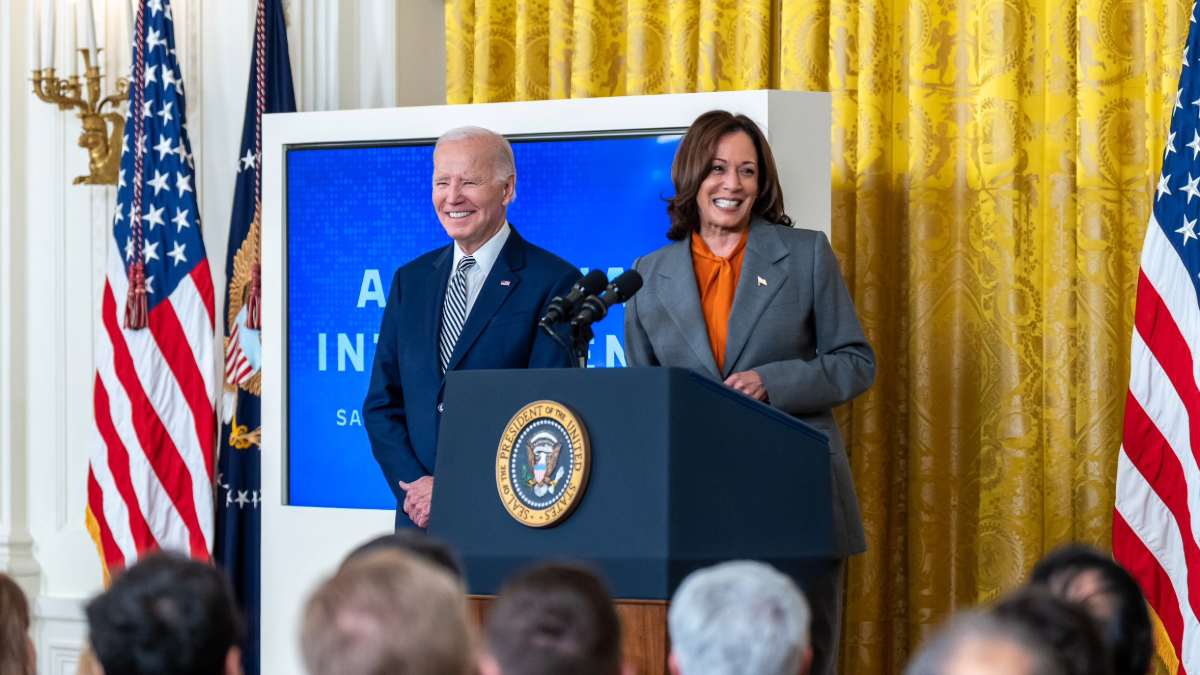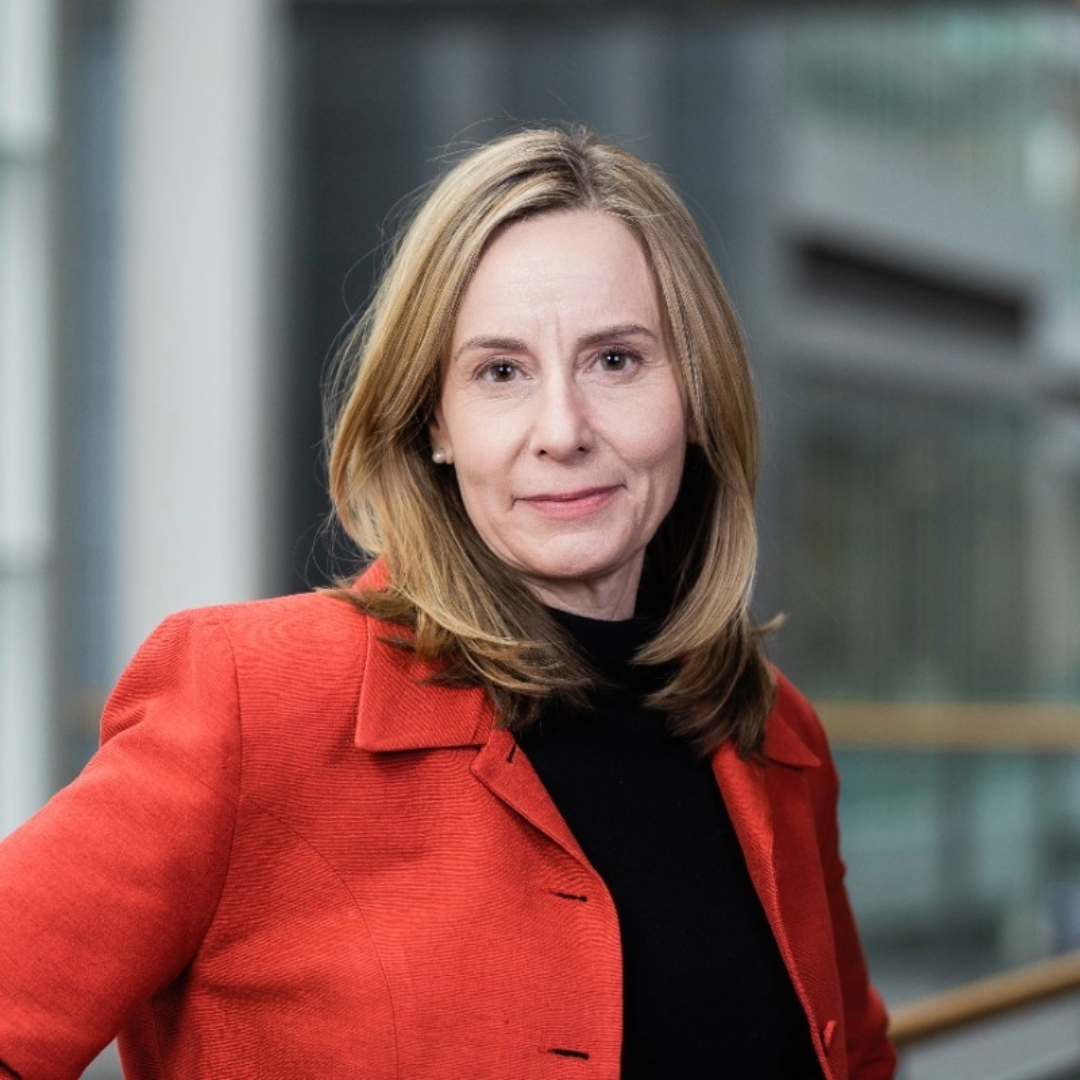Innovation & Safety Are Products of Open Source
Rebecca Finlay, Mark Surman / Aug 14, 2024Rebecca Finlay is CEO of the Partnership on AI and Mark Surman is President of Mozilla.

US President Joe Biden and Vice President Kamala Harris at the signing of an executive order on artificial intelligence, October 30, 2023. Source
Once a niche topic in research labs, AI applications are now in the hands of millions across the globe. With the launch of OpenAI’s ChatGPT, generative AI captured the attention of the public, policymakers, and the business community like few technologies before it. Although the exact impacts of generative AI and foundation models on the economy and society are unclear, what is indisputable is that AI in all its forms has already deeply permeated our lives, from how we work and learn to how we entertain ourselves at home.
But while the public has marveled at the growing capabilities of generative AI, there has been a larger debate unfolding over the future of AI and whether the technology should be open or closed. As arguments abound over the risks and benefits of building a technology as important as AI in the open, it is important to remember that today’s AI era would not have been possible without open publication of AI research: the transformer method that undergirds the performance of today’s generative AI applications was published in a 2017 industry paper made accessible to all and not as proprietary intellectual property.
Recognizing the potential impact of AI, the Biden administration released an Executive Order (EO) to drive action on AI across the United States federal government. The EO directs more than 100 actions across dozens of federal agencies, including one which required the National Telecommunications and Information Administration (NTIA) to examine the benefits and the risks associated with making foundational AI models open and widely available.
On July 30, NTIA released its report on AI openness, covering different scenarios, risks, and benefits. Based on the collected evidence, the report shows that the government should keep supporting an open AI ecosystem. It also suggests creating a system to gather important information for making future decisions on AI as it evolves.
We believe the next administration should not only follow NTIA’s recommendations to keep AI open, but also take additional actions that promote open innovation and ensure that the benefits of AI are shared widely across America, not just in coastal tech hubs. First, the government should protect citizens’ privacy and act to reduce the online harms of synthetic media on vulnerable populations. Second, articulate a vision to build and invest in an AI infrastructure that serves the public interest. This includes a commitment to publicly funded research to apply AI to the world’s most challenging questions. It also means providing increased access to computing power and open, high-quality datasets. Third, invest in citizens and communities through worker protections, media literacy and skills development.
These actions would create an opportunity to shift the benefits of the new wave of technological innovation from Silicon Valley to the rest of the United States, creating new jobs and real opportunity for all Americans. Today, we see the power of open-source AI in a huge range of applications, from Mozilla’s open-source Common Voice, which is helping to preserve the linguistic culture of millions worldwide, to Stanford’s Center for Artificial Intelligence in Medicine and Imaging, which is working to expand what is already “the world’s largest free repository of AI-ready annotated medical imaging datasets.” Independent organizations like Partnership on AI have openly published tools to advance responsible AI governance.
We, like many others, think that AI is too important to be developed in secret. It must be built in the open, allowing everyone, not just big companies, to contribute to its progress. Open-source technology has proven time and again to be a net benefit for society: A recent Harvard Business School working paper found that open source software (OSS) is, “a global public good that plays a vital role in the economy and is foundational for most technology we use today,” estimating the supply-side value of widely-used open source software at over $4 billion while the demand-side value was estimated to be more than $8 trillion. A Columbia Business School report found “a clear correlation between countries with higher contributions to OSS and the number of new technology ventures founded in the following year.”
And the merits of openness stretch much further than software. Building in public and providing access creates accountability and allows for the wisdom of the crowd to help solve pressing societal issues. Take OpenFold, for example, which is a nonprofit research consortium promoting the development of free and open source software tools for biology and drug discovery. Likewise, OpenStreetMap has embraced open source principles to create real-time and open map data that enables disaster responders to reach those in need.
Rather than debate the nuances of open vs. closed models, the newly released NTIA report underscores the necessity of sustained research on AI’s capabilities and risks. This research is crucial to advance safety and accountability in all model development and deployment. Equally important, the report urges innovative policy ideas to invest in the infrastructure needed to advance AI for everyone.
If governments embrace open innovation and put the right tools, standards, and institutions in place for testing and accountability, companies and start-ups can use AI to drive innovation in all areas – to help solve unique problems and support many different communities. This will enable new voices and contributions to create a whole much greater than the sum of its parts.
RELATED READING:
Authors

